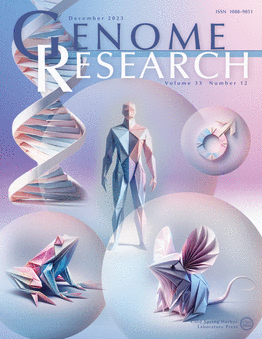利用全同态加密在联合人类甲基化数据上进行保护隐私的生物年龄预测
IF 6.2
2区 生物学
Q1 BIOCHEMISTRY & MOLECULAR BIOLOGY
引用次数: 0
摘要
DNA 甲基化数据在估算哺乳动物的纪年年龄方面起着至关重要的作用,可实时了解个体的衰老过程。表观遗传起搏器(EPM)模型可以推断出偏离群体趋势的生物年龄。鉴于这些数据的敏感性,必须保护 EPM 模型的输入和输出。在最近的一项研究中,介绍了一种利用完全同态加密(FHE)进行 EPM 计算的隐私保护方法。我们的研究提出了一种新的 EPM 计算隐私保护协议,从分析上改善了隐私保护和复杂性。值得注意的是,我们在安全计算阶段只使用了一个服务器,同时即使在服务器损坏的情况下也能确保隐私(相比之下,需要两个非共用服务器)。新协议使用符号代数和数论技术,消除了安全计算期间的通信需求,显著提高了渐近运行时间,并更好地兼容并行计算,进一步降低了时间复杂性。我们已经实施了我们的协议,证明它能够产生与标准(不安全)EPM 模型类似的结果,与以前的方法相比,性能有了大幅提高。这些发现为提高个人隐私至关重要的医疗应用中的数据安全性带来了希望。新方法和 EPM 的通用性表明,该协议可能适用于采用类似期望最大化技术的其他用途。本文章由计算机程序翻译,如有差异,请以英文原文为准。
Privacy-preserving biological age prediction over federated human methylation data using fully homomorphic encryption
DNA methylation data plays a crucial role in estimating chronological age in mammals, offering real-time insights into an individual’s aging process. The Epigenetic Pacemaker (EPM) model allows inference of the biological age as deviations from the population trend. Given the sensitivity of this data, it is essential to safeguard both inputs and outputs of the EPM model. In a recent study, a privacy-preserving approach for EPM computation was introduced, utilizing Fully Homomorphic Encryption (FHE). However, their method had limitations, including having high communication complexity and being impractical for large datasets Our work presents a new privacy preserving protocol for EPM computation, analytically improving both privacy and complexity. Notably, we employ a single server for the secure computation phase while ensuring privacy even in the event of server corruption (compared to requiring two non-colluding servers. Using techniques from symbolic algebra and number theory, the new protocol eliminates the need for communication during secure computation, significantly improves asymptotic runtime and and offers better compatibility to parallel computing for further time complexity reduction. We have implemented our protocol, demonstrating its ability to produce results similar to the standard (insecure) EPM model with substantial performance improvement compared to previous methods. These findings hold promise for enhancing data security in medical applications where personal privacy is paramount. The generality of both the new approach and the EPM, suggests that this protocol may be useful to other uses employing similar expectation maximization techniques.
求助全文
通过发布文献求助,成功后即可免费获取论文全文。
去求助
来源期刊

Genome research
生物-生化与分子生物学
CiteScore
12.40
自引率
1.40%
发文量
140
审稿时长
6 months
期刊介绍:
Launched in 1995, Genome Research is an international, continuously published, peer-reviewed journal that focuses on research that provides novel insights into the genome biology of all organisms, including advances in genomic medicine.
Among the topics considered by the journal are genome structure and function, comparative genomics, molecular evolution, genome-scale quantitative and population genetics, proteomics, epigenomics, and systems biology. The journal also features exciting gene discoveries and reports of cutting-edge computational biology and high-throughput methodologies.
New data in these areas are published as research papers, or methods and resource reports that provide novel information on technologies or tools that will be of interest to a broad readership. Complete data sets are presented electronically on the journal''s web site where appropriate. The journal also provides Reviews, Perspectives, and Insight/Outlook articles, which present commentary on the latest advances published both here and elsewhere, placing such progress in its broader biological context.
 求助内容:
求助内容: 应助结果提醒方式:
应助结果提醒方式:


